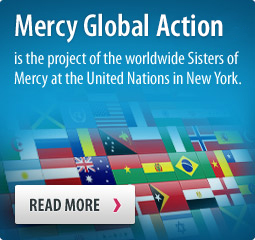
Mercy Event at UN Stresses Human Rights-based Implementation of SDG 6
Reports: July 18, 2016
On Monday, 11 July, Sisters of Mercy joined the Republic of Palau, the NGO Mining Working Group, Salesian Missions, and the Greek Orthodox Archdiocese in hosting an insightful side event discussing the ways in which the human right to water and sanitation is central to Sustainable Development Goal 6. Watch the UN webcast of the event here.
.JPG)
As laid out in the event’s concept note, panelists linked the human right to water and sanitation and water justice with 'poverty eradication, gender equality, hunger eradication, good health, climate action, and sustainable communities'. The human right to water and sanitation was shown to be integral to the realization of all other human rights and to sustainable development as a whole. Panelists also named and reflected upon 'several development implementation pitfalls that are currently threatening the viability of the 2030 Agenda, the well-being of the world’s peoples, and the habitability of the planet'.
Thomas Gass, Assistant Secretary-General for Policy Coordination and Inter-Agency Affairs in UN DESA, moderated the event and noted that he would bring a summary of the event, including participants’ concerns, to the High Level Panel on Water.
In a written message addressed to the side event, the Deputy Secretary-General to the United Nations said, 'This event rightly highlights that safe drinking water and adequate sanitation are not only essential human rights, but are integrally linked to broader efforts to provide well-being and dignity to all people. I commend Member States for recognizing the right to water and to sanitation in the 2030 Agenda and for adopting Sustainable Development Goal 6 to realize it'.
The office of the High Commissioner for Human Rights (OHCHR) also sent a written message to the side event. The OHCHR statement stressed, 'water and sanitation cannot be treated as mere commodities. What they represent for human beings, for their development and for their dignity goes far beyond something that can be bought or sold'. The statement also highlighted how water justice is linked to a human rights approach for implementation, asserting, 'A human rights perspective goes beyond a need or charitable perspective. It calls for access to justice and accountability of duty-bearers for respecting, protecting and fulfilling their human rights obligations'.
H.E. Dr. Caleb Otto, Permanent Representative of the Republic of Palau, a major champion of the human right to water and sanitation throughout negotiations leading up to the adoption of the SDGs, opened the panel discussion noting the importance of protecting the human right to water and sanitation and the challenges brought about by climate change, especially for small island developing states. He also stressed the need for vigilance surrounding the human right to water in order to 'protect the human rights to life of all people' and “to ensure that "no one in the world" is "left behind" with respect to access to clean water'.
Mr. Léo Heller, Special Rapporteur on the human right to safe drinking water and sanitation, focused on processes to ensure that implementation of SDG 6 focuses on the most marginalized. He said, 'If business as usual prevails in expansion of access to services from 2016 on, the well-known gap between the wealthiest and the poorest will remain or will decrease at a very slow rate. A human rights approach […] requires that the most marginalized receive preferential attention.'
Salote Soqo, Senior Program Leader for Climate Justice at the Unitarian Universalist Service Committee, explained how her organization and its partners worldwide have found that 'privatization and commodification of water resources systematically derives impoverished and indigenous communities of their rights'. She cited examples of infringements upon the human right to water and sanitation from a new report on water unaffordability in the United States, but also highlighted key examples of improvements and achievements around the world regarding the protection of people’s human rights to water and sanitation regardless of ability to pay.
Panelist Christiana Peppard, Assistant Professor of Ethics at Fordham University, highlighted the moral and economic reasons for ensuring that the Human Right to Water and Sanitation is central to the SDG agenda. She also presented ethical and economic reasons for the failures of the privatization model. She called for ethical frames for protecting the needs of the poor and vulnerable and future generations not just from corporate shareholder excess but also from failures internal to economic valuation of water.
Finally, Meera Karunananthan, a water justice campaigner with the Blue Planet Project of the Council of Canadians, discussed the differences in processes and outcomes between a rights-based vision of water and sanitation and a commodity-based perspective as Member States implement SDG 6. She highlighted the role of neoliberal economics in the facilitation of reckless use of water resources and the ways in which a human rights-based approach can reorient global development policy towards health and well-being of people and the earth.
The timely event took place on the opening day of the 2016 High-level Political Forum for Sustainable Development, the “United Nations central platform for follow-up and review” of the Sustainable Development Goals (SDGs). As UN Member States discuss implementation and progress made on the SDGs the first year out of the gate, panelists reflected upon the UN’s mandate to protect human rights overall, and in particular, the commitment made to the human right to water and sanitation in the Declaration of the Agenda. Many called upon UN Member States to exercise this mandate as the move to make progress on SDG 6, 'Ensure availability and sustainable management of water and sanitation for all'.
Messages to: Angela Reed rsm - Resident, Mercy Global Action
Image: Áine O'Connor rsm addresses the event. Sr Áine's intervention begins at 1:12:29




